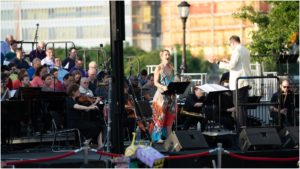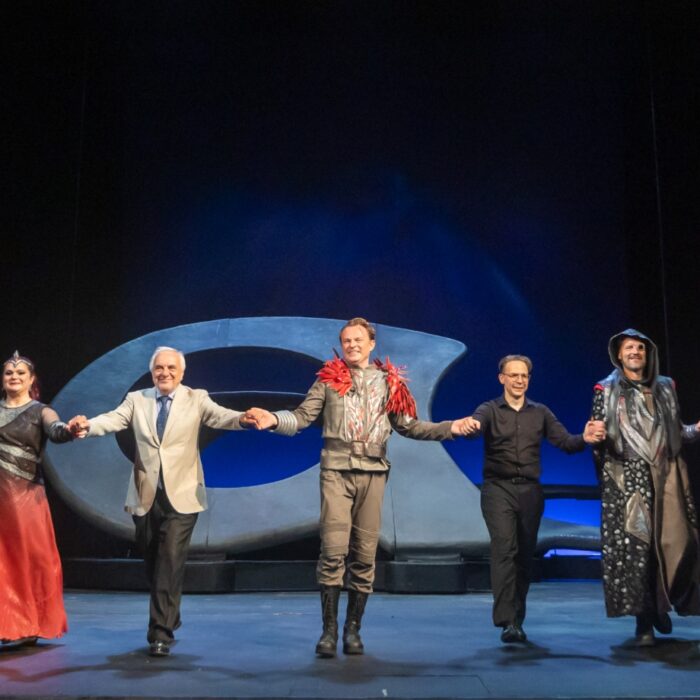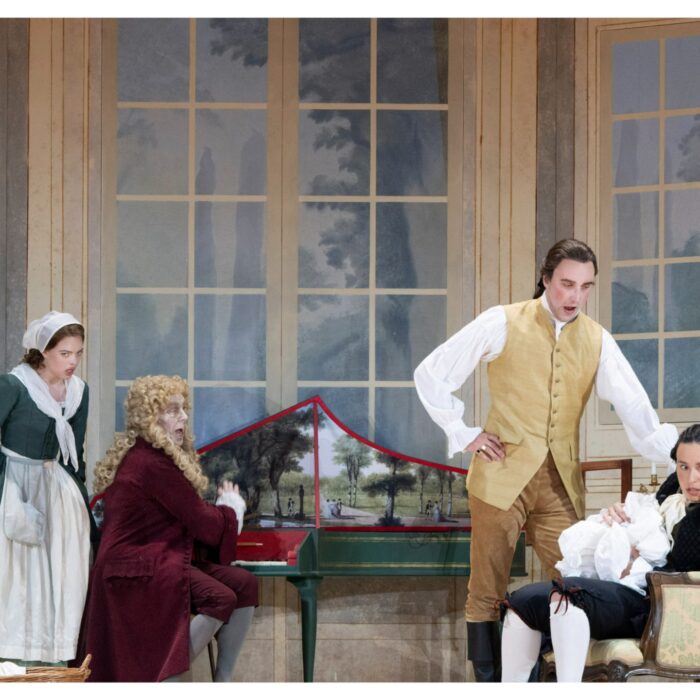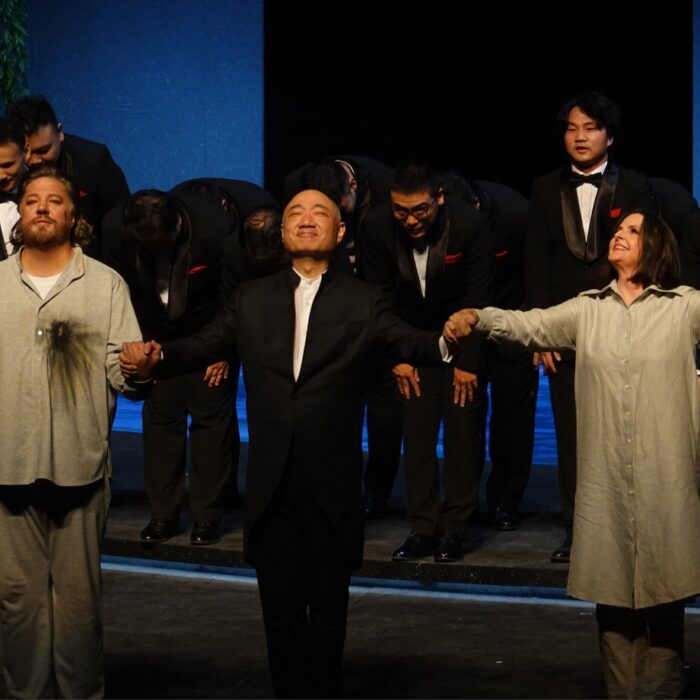
River to River Festival 2018 Review: Naamah’s Ark
Marisa Michelson & Royce Vavrek’s Work Highlights Essential Social Issues
By Jennifer PyronThis Review is for the performance on Sunday, June 17th.
The River to River Festival, presented by the Lower Manhattan Cultural Council (LMCC), showcased Marisa Michelson and Royce Vavrek’s “Naamah’s Ark” in Rockefeller Park at the start of this year’s 76th season. This community oratorio included seven ensembles and six soloists – Victoria Clark, as Naamah, Cantor Rebecca Garfein of Congregation Rodeph Sholom, as a Soloist, Melody Betts, as a Gospel Soloist, Sachal Vasandani, as Merman, Nicole Coffaro, as a Dove Soloist, and Emre Durali, as Azan Soloist. Also present were the MasterVoices, Stuyvesant High School Chorus, Jerriese Johnson Gospel Choir of Middle Collegiate Church, members of the Congregation Rodeph Sholom Adult Choir, Hispanic Women’s Ensemble, Migration Drums Ensemble and Naamah’s Ark Instrumental Ensemble.
Everyone, ranging in age and religion, was brought together to deliver the untold story of Naamah; the name given to Noah’s wife in the Jewish writing known as the Genesis Rabba. Although the Bible does not mention information regarding Naamah, including her name, one can only imagine the remarkable inspirational life that this woman lead during extraordinarily difficult times.
Listeners were also enlightened and deeply impacted by the piece’s overall empathy for the topic of climate change: “As long as the earth endures… Seedtime and harvest, cold and heatl Summer and winter, day and night will never cease.”
This reprise was introduced to the audience by Ted Sperling, MasterVoices’ Artistic Director and the evening’s Conductor. He informed the audience that they too would have an opportunity to participate in the telling of Naamah’s story by singing this passage and following along with the libretto in the program.
Immediately highlighting the importance of reading and understanding Vavrek’s text was an effective start to the program, which lead the audience further into a profound community based musical experience.
Everyone’s Voice Told Her Story
In the program notes, Michelson explained the piece: “In Naamah’s Ark, Vavrek and I attempt to tell the story of Naamah, Noah’s nameless wife, as she ushers humanity into its next stage of evolution after a great flood, reminiscent of those we are beginning to experience during this time of global warming. After successfully seeing all the animals off the ark and onto dry land, Naamah chooses not to join her husband and children, but instead to follow the siren call of the Merman who has been swimming next to the ark. She exits the world as it is, and joins the world of mythology instead, because the world is not ready for who she wants to be.”
Understanding Naamah’s journey required one to expand their mind and creative imagination. This was key to following along with the performance and gaining insight to the fearlessness of this profoundly relentless woman, who remained strong enough to spiritually lead all by example, while her husband was spiraling into the depths of alcoholism. The story explained how Noah was numb to all that was happening on and off the ark, while Naamah exemplified hope and perseverance.
When Intelligent Life Refuses to Learn
One portion of Vavrek’s libretto uncovered ancient wisdom through the perspective of the whales, which may have caused listeners to consider our planet’s current crisis:“Floods destroy the memories of all that came before; Floods and life, destructive cycles more and more and more and more; Bimey hitchadshut livyatanim, s’viv hatevot ein hat’vuna; Lomedet mita ‘uyot ha’avot.”
When asked by OperaWire about this passage, Vavrek translated his own words from Hebrew to English, so readers can understand the key message: “Whales accompany the many arks when renewal is demanded. Intelligent life refuses to learn from the mistakes of its ancestors.”
At this point in the libretto, the audience may gain perspective and feel a deeper connection with understanding the time in which this story took place and how it still unifies pre-existing and existing humanity today. Vavrek covered a variety of dialogues in his writing that encouraged the listener to relate to all forms of life and to consider how one affects the other.
When OperaWire asked Vavrek where he received his inspiration for the story, he explained: “I’ve always loved the story of Noah’s ark. Timothy Findley wrote this wonderful novel called ‘Not Wanted on the Voyage’ which imagines the myth of the ark through multiple perspectives, including that of a cat that is snuck on the ark. I’ve always wanted to dig into the story myself and I thought that by looking at the piece through the eyes of Noah’s wife (unnamed in the bible) would create an interesting new angle to enter the story in.
“It has been a great joy to create this piece that gives so many people an opportunity to lend their talents to. Being that this was a community oratorio, we really wanted this to be as inclusive as possible. It was important that the stage be filled with as diverse a collection of performers – all ages, genders, faiths and races welcome. We were all given a voice, and it’s important to remember that we all fit within a larger tapestry. In a time when financial realities mean that a lot of smaller works are easier to program, here was an opportunity for Marisa and I to create something large and inclusive,” said Vavrek.
Call to Prayer
“Collective prayer is really important in this piece. It is a way for all forms of life to find interconnectedness, and I think in some ways the prayer summons the gift of God’s rainbow/covenant,” said Vavrek.
The “Call to Prayer” passage may be seen as the climactic point in the piece because it is just after the reprise and before Naamah’s prayer to God for a Great Migration. In it, Emre Durali, as Azan, bears witness to God through song: “Allah is the Greatest; I bear witness that there is no God except the One God.”
At this point, Naamah also joined in the prayer to address the sleeping animals and prayed over the future of humanity. Victoria Clark, as Naamah, delivered an inspiring interpretation of Naamah. Known widely for her performances in musical theatre, Clark showcased a voice that resonated in truth and originality.
When OperaWire asked Clark afterwards what her favorite part of the piece was, she explained: “Everything the Stuyvesant High School Chorus sang was my favorite thing. We are ‘borrowing the bounty’ while we are here. I love that image. And I hope that’s what everyone’s take away was.”
OperaWire also mentioned this passage to Varek and he responded by saying: “I love this moment… for me it’s all about understanding that the world is on loan to us, and that we need to treat it, and each other, with respect. I think it is important that the high school chorus represented the next generation, because they are going to inherit the world in all of its glory… and problems. The kids are the hope for the future,” said Vavrek.
After the performance, OperaWire also spoke with Rebecca Garfein who summarized the piece best by saying: “This is a unifying piece of work that involves multi-generational and multi-religious backgrounds and I think that Michelson and Vavrek tap into something profound by bringing everyone together.”


